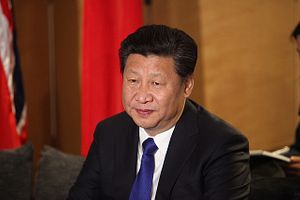Chinese President Xi Jinping, who also holds the positions of chairman of the Central Military Commission (CMC) — the highest seven-member organ that controls China’s military — and general secretary of the Chinese Communist Party (CCP) Central Committee, has been actively enhancing his power in the military since the close of the CCP’s 19th National Congress.
On November 5, the CMC released a guideline under the title of “Carrying out the CMC Chairman Responsibility System in an all-around and profound way,” demanding “absolute loyalty” from the military to Xi himself.
The so-called “CMC Chairman Responsibility System,” meaning that “the chairman assumes overall responsibility for the work of the Central Military Commission” as it reads in China’s Constitution, is actually nothing new in China’s political dictionary. What’s worth noting is that since 2014 — after Xi came into office — the idea of the “CMC Chairman Responsibility System” has been repeatedly mentioned by Chinese state media, especially Chinese military media.
During the 19th Party Congress, the idea of implementing “the CMC Chairman Responsibility System” was finally added into the CCP’s Constitution — a move further consolidating the chairman’s power over the military. The idea of “the CMC Chairman Responsibility System” has been incorporated both in China’s Constitution and the CCP’s Constitution.
The newly released CMC guideline claimed that “the CMC Chairman Responsibility System” is a great achievement obtained by the CCP through experience and tradition. According to the guideline, the system can benefit “the military in the new age, the long-term peace and stability of the CCP and the country, and the future destiny of socialism with Chinese characteristics.”
Particularly in terms of Chairman Xi, The guideline emphasized:
[China’s military] must take Xi Jinping Thought on Socialism with Chinese Characteristics for a New Era as the guidance, fully implement Xi’s thinking on strengthening the military, follow the absolute leadership of the CCP… The whole military must be absolutely loyal, pure, and reliable to Xi and must follow Chairman Xi’s command, answer to his order, and never let him worry.
Notably, before the 19th Party Congress, while stressing Xi’s special role, CCP documents tended to use phrases like “maintaining the central authority and leadership of the CCP Central Committee with Xi Jinping as the core.” In comparison, the latest guideline didn’t bother to mention the Central Committee, but emphasized the military’s loyalty to Xi as an individual.
Yet, while the centralization of Xi’s personal power over the military as well as the whole party is unquestionable after the 19th Party Congress, the repetitive references to the importance of “the CMC Chairman Responsibility System” also imply that Xi hasn’t achieved full control over the military in reality. The title of the new guideline also hints that the system has so far failed to be implemented “in an all-around and profound way” as expected.
In March 2017, an official of the CMC Discipline Inspection Commission — the highest anti-graft organ within the military — published an article in a military magazine. The article revealed that Xu Caihou and Guo Boxiong — the two highest ranking military officials to have been brought down under the anti-corruption campaign launched by Xi — “openly defied and betrayed the CMC Chairman Responsibility System” when they were in office. Thus, the article called for “eliminating the baneful influence of Guo and Xu” within the military.
It seems that the process of elimination is still under way.

































